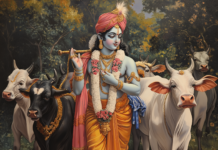Yoga, in its essence, is much more than a physical practice aimed at enhancing flexibility and strength. It is a comprehensive philosophy that encompasses various aspects of human existence, offering a profound understanding of life, consciousness, and self-realization. Originating in ancient India, the philosophy of yoga has a rich history that dates back thousands of years. Let us embark on a journey to explore its ancient roots and delve into the profound wisdom that lies at its core.
The word “yoga” is derived from the Sanskrit root word “yuj,” which means to yoke or unite. It suggests the union of the individual self with the universal consciousness, bringing about a state of harmony, balance, and inner peace. Yoga is deeply rooted in Indian philosophy and has its foundation in the ancient texts known as the Vedas, specifically in the Upanishads and the Bhagavad Gita.
The Upanishads, written between 800 and 200 BCE, are a collection of mystical texts that delve into the nature of reality, consciousness, and the ultimate truth. They emphasize the concept of “Brahman,” the supreme cosmic power, and the interconnectedness of all beings. The Upanishads introduce the idea of self-inquiry and contemplation as a means to transcend the limitations of the ego and merge with the infinite.
Another influential scripture that greatly contributes to the philosophy of yoga is the Bhagavad Gita. It is a sacred dialogue between Lord Krishna and the warrior Arjuna, set on the battlefield of Kurukshetra. The Gita addresses the moral and philosophical dilemmas faced by Arjuna and provides profound insights into the nature of duty, devotion, and the path to self-realization. It emphasizes the practice of “Karma Yoga,” the path of selfless action, and “Bhakti Yoga,” the path of devotion, as means to attain spiritual liberation.
Yoga philosophy acknowledges the ever-changing and impermanent nature of the external world. It highlights the concept of “Maya,” which refers to the illusionary nature of the material world. According to yoga philosophy, the external world is subject to constant flux and is ultimately transient. True fulfillment and liberation lie in transcending attachment to the material world and realizing the eternal essence within.
The philosophy of yoga also offers profound insights into the nature of suffering and the path to liberation from it. It recognizes that suffering arises from the misidentification with the transient aspects of existence, such as the physical body, thoughts, and emotions. By cultivating self-awareness, practicing detachment, and seeking union with the divine, one can gradually overcome suffering and attain a state of inner peace and contentment.
The philosophy of yoga also delves into the concept of energy and the subtle body. It recognizes that beyond the physical body, there are subtle energetic channels known as “nadis” and energy centers called “chakras.” These nadis and chakras are believed to be pathways through which vital life force, known as “prana,” flows. The philosophy of yoga explores the practices of pranayama (breath control) and the awakening and balancing of the chakras to enhance the flow of prana and promote overall well-being.
Another significant aspect of yoga philosophy is the concept of “Dharma.” Dharma refers to one’s duty or righteous path in life. It emphasizes the importance of living in accordance with one’s true nature and fulfilling one’s responsibilities and obligations to society. By living a life aligned with Dharma, individuals contribute to the greater harmony and well-being of the world.
Additionally, yoga philosophy offers insights into the nature of the mind and the practice of meditation. It recognizes that the mind is often restless and filled with constant thoughts, leading to distraction and suffering. Through the practices of concentration (Dharana) and meditation (Dhyana), individuals can develop mental clarity, focus, and a deeper understanding of the nature of their thoughts and emotions. The ultimate goal is to attain a state of pure awareness and transcendence known as Samadhi.
The philosophy of yoga extends beyond the practice of physical postures and meditation. It encompasses a deep understanding of the interconnectedness of body, mind, and spirit. It recognizes that each individual is a microcosm of the universe and that true fulfillment can be found through self-realization and the realization of one’s connection to the divine. It delves into the nature of consciousness itself and explores the fundamental questions of life, such as the purpose of existence, the nature of reality, and the relationship between the individual and the universal.
One of the key concepts in yoga philosophy is the notion of “Atman” and “Brahman.” Atman refers to the individual self or soul, while Brahman represents the universal consciousness or the ultimate reality. Yoga philosophy posits that the true nature of the individual self is identical to the universal consciousness. The practice of yoga, through its various techniques and disciplines, aims to unveil this inherent unity and dissolve the illusion of separateness.
Yoga as a comprehensive philosophy was systematized and expounded upon by the sage Patanjali in his work, the Yoga Sutras. Written around 400 CE, the Yoga Sutras outline the eight-fold path of yoga, known as Ashtanga Yoga. These eight limbs, or steps, provide a holistic approach to spiritual growth and self-realization. They include ethical principles (Yamas and Niyamas), physical postures (Asanas), breath control (Pranayama), withdrawal of senses (Pratyahara), concentration (Dharana), meditation (Dhyana), and the state of pure blissful consciousness (Samadhi).
Furthermore, yoga philosophy emphasizes the importance of cultivating virtues and qualities that lead to personal growth and transformation. The Yamas and Niyamas, which are ethical principles outlined by Patanjali in the Yoga Sutras, provide guidelines for living a meaningful and purposeful life. The Yamas, which include non-violence, truthfulness, non-stealing, moderation, and non-possessiveness, promote a harmonious and compassionate relationship with oneself and others. The Niyamas, consisting of cleanliness, contentment, discipline, self-study, and surrender to a higher power, encourage self-discipline, self-reflection, and spiritual growth.
Patanjali’s Yoga Sutras also delve into the nature of the mind and the concept of “Chitta Vritti Nirodha,” which means the cessation of the fluctuations of the mind. According to Patanjali, the fluctuations of the mind are the root cause of suffering, and through the practice of yoga, one can attain a state of stillness, clarity, and liberation.
Yoga philosophy also offers valuable insights into the nature of suffering and the path to liberation. It acknowledges that the human experience is characterized by the fluctuations of the mind, the attachment to desires, and the identification with the ego. Through the practices of yoga, one can gradually transcend these limitations and realize the eternal nature of the self.
The philosophy of yoga also encompasses the principle of selfless service and compassion towards others, known as “Seva.” It encourages individuals to extend their practice beyond themselves and contribute to the well-being and upliftment of others and society as a whole. By engaging in acts of kindness, charity, and service, individuals cultivate a sense of interconnectedness and create a positive impact on the world.
It is important to note that while the philosophy of yoga provides a comprehensive framework for spiritual growth and self-realization, it is not a dogmatic or rigid system. It encourages individuals to explore and discover their own path, adapting the teachings to their unique journey and personal beliefs. The philosophy of yoga recognizes the diversity of human experiences and honors the individual’s capacity for self-discovery and inner wisdom.
Moreover, yoga philosophy recognizes that the path to self-realization is not limited to a particular religion, belief system, or cultural background. It is a universal philosophy that can be embraced by individuals from all walks of life. Yoga encourages seekers to explore their own direct experience and discover their personal truth.
In modern times, the philosophy of yoga has gained widespread recognition and has been embraced by people around the world. It is not confined to the realm of spiritual practice but has also influenced various fields such as psychology, neuroscience, and holistic health. The principles and teachings of yoga philosophy continue to inspire individuals to live with mindfulness, compassion, and a deeper connection to themselves and the world around them.
In conclusion, the philosophy of yoga, with its ancient roots in the Vedas, Upanishads, and the Bhagavad Gita, offers a profound understanding of life, consciousness, and self-realization. It goes beyond the physical practice of yoga postures and encompasses a holistic approach to spiritual growth and inner transformation. It explores concepts such as unity, consciousness, suffering, duty, energy, virtue, and meditation. By exploring the depths of yoga philosophy, individuals can cultivate a greater sense of self-awareness, find harmony within themselves and the world, and embark on a path of profound personal and spiritual evolution, and a harmonious way of living that is relevant and applicable in the modern world.





























